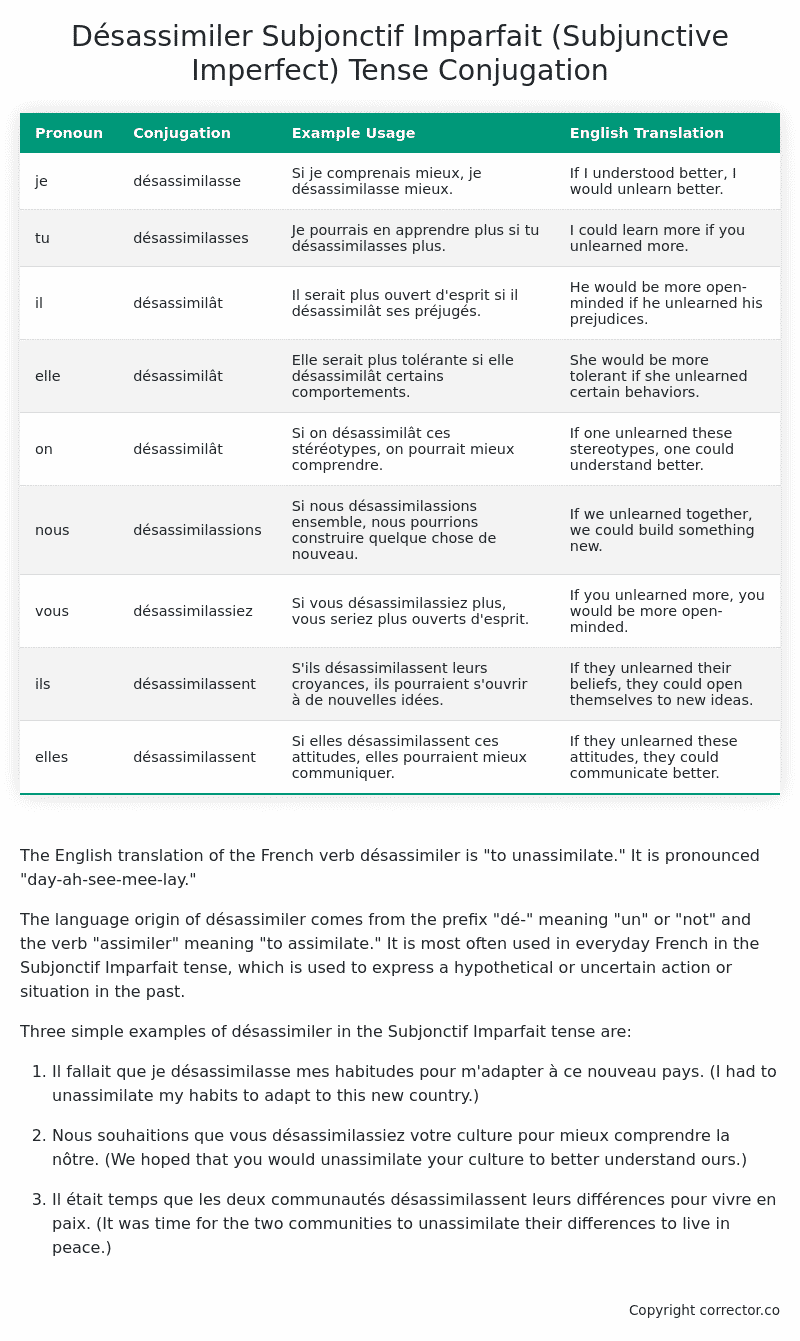Subjonctif Imparfait (Subjunctive Imperfect) Tense Conjugation of the French Verb désassimiler
Introduction to the verb désassimiler
The English translation of the French verb désassimiler is “to unassimilate.” It is pronounced “day-ah-see-mee-lay.”
The language origin of désassimiler comes from the prefix “dé-” meaning “un” or “not” and the verb “assimiler” meaning “to assimilate.” It is most often used in everyday French in the Subjonctif Imparfait tense, which is used to express a hypothetical or uncertain action or situation in the past.
Three simple examples of désassimiler in the Subjonctif Imparfait tense are:
-
Il fallait que je désassimilasse mes habitudes pour m’adapter à ce nouveau pays. (I had to unassimilate my habits to adapt to this new country.)
-
Nous souhaitions que vous désassimilassiez votre culture pour mieux comprendre la nôtre. (We hoped that you would unassimilate your culture to better understand ours.)
-
Il était temps que les deux communautés désassimilassent leurs différences pour vivre en paix. (It was time for the two communities to unassimilate their differences to live in peace.)
Table of the Subjonctif Imparfait (Subjunctive Imperfect) Tense Conjugation of désassimiler
| Pronoun | Conjugation | Example Usage | English Translation |
|---|---|---|---|
| je | désassimilasse | Si je comprenais mieux, je désassimilasse mieux. | If I understood better, I would unlearn better. |
| tu | désassimilasses | Je pourrais en apprendre plus si tu désassimilasses plus. | I could learn more if you unlearned more. |
| il | désassimilât | Il serait plus ouvert d’esprit si il désassimilât ses préjugés. | He would be more open-minded if he unlearned his prejudices. |
| elle | désassimilât | Elle serait plus tolérante si elle désassimilât certains comportements. | She would be more tolerant if she unlearned certain behaviors. |
| on | désassimilât | Si on désassimilât ces stéréotypes, on pourrait mieux comprendre. | If one unlearned these stereotypes, one could understand better. |
| nous | désassimilassions | Si nous désassimilassions ensemble, nous pourrions construire quelque chose de nouveau. | If we unlearned together, we could build something new. |
| vous | désassimilassiez | Si vous désassimilassiez plus, vous seriez plus ouverts d’esprit. | If you unlearned more, you would be more open-minded. |
| ils | désassimilassent | S’ils désassimilassent leurs croyances, ils pourraient s’ouvrir à de nouvelles idées. | If they unlearned their beliefs, they could open themselves to new ideas. |
| elles | désassimilassent | Si elles désassimilassent ces attitudes, elles pourraient mieux communiquer. | If they unlearned these attitudes, they could communicate better. |
Other Conjugations for Désassimiler.
Le Present (Present Tense) Conjugation of the French Verb désassimiler
Imparfait (Imperfect) Tense Conjugation of the French Verb désassimiler
Passé Simple (Simple Past) Tense Conjugation of the French Verb désassimiler
Passé Composé (Present Perfect) Tense Conjugation of the French Verb désassimiler
Futur Simple (Simple Future) Tense Conjugation of the French Verb désassimiler
Futur Proche (Near Future) Tense Conjugation of the French Verb désassimiler
Plus-que-parfait (Pluperfect) Tense Conjugation of the French Verb désassimiler
Passé Antérieur (Past Anterior) Tense Conjugation of the French Verb désassimiler
Futur Antérieur (Future Anterior) Tense Conjugation of the French Verb désassimiler
Subjonctif Présent (Subjunctive Present) Tense Conjugation of the French Verb désassimiler
Subjonctif Passé (Subjunctive Past) Tense Conjugation of the French Verb désassimiler
Subjonctif Imparfait (Subjunctive Imperfect) Tense Conjugation of the French Verb désassimiler (this article)
Conditionnel Présent (Conditional Present) Tense Conjugation of the French Verb désassimiler
Conditionnel Passé (Conditional Past) Tense Conjugation of the French Verb désassimiler
L’impératif Présent (Imperative Present) Tense Conjugation of the French Verb désassimiler
L’infinitif Présent (Infinitive Present) Tense Conjugation of the French Verb désassimiler
Struggling with French verbs or the language in general? Why not use our free French Grammar Checker – no registration required!
Get a FREE Download Study Sheet of this Conjugation 🔥
Simply right click the image below, click “save image” and get your free reference for the désassimiler Subjonctif Imparfait tense conjugation!

Désassimiler – About the French Subjonctif Imparfait (Subjunctive Imperfect) Tense
Formation
Common Everyday Usage Patterns
Interactions with Other Tenses
Subjonctif Présent
Indicatif Passé Composé
Conditional
Conditional Perfect
Summary
I hope you enjoyed this article on the verb désassimiler. Still in a learning mood? Check out another TOTALLY random French verb conjugation!


